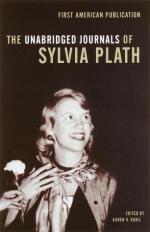|
This section contains 7,031 words (approx. 24 pages at 300 words per page) |

|
SOURCE: Materer, Timothy. “Occultism as Source and Symptom in Sylvia Plath's ‘Dialogue Over a Ouija Board.’” Twentieth Century Literature 37, no. 2 (Summer, 1991): 131-47.
In the following essay, Materer analyzes the Freudian implications of occultism in Plath's poetry.
“O Oedipus. O Christ. You use me ill,” are the concluding lines of Sylvia Plath's “The Ravaged Face” (116).1 In this poem, Plath uses a major trope of modern writers, the wholesale rejection of the past, represented here by two symbolic figures from the Greek and Judeo-Christian traditions. The historical discontinuity of the modern age with the past is familiar in many modernist writers, as in Yeats's prediction of a violent conclusion to the 2000-year cycle of Christianity and Eliot's less violent but still destructive “dissociation of sensibility.” But the closest we can come to Plath's sense of this discontinuity is probably Ted Hughes's statement about contemporary writers who have gone beyond the...
|
This section contains 7,031 words (approx. 24 pages at 300 words per page) |

|


